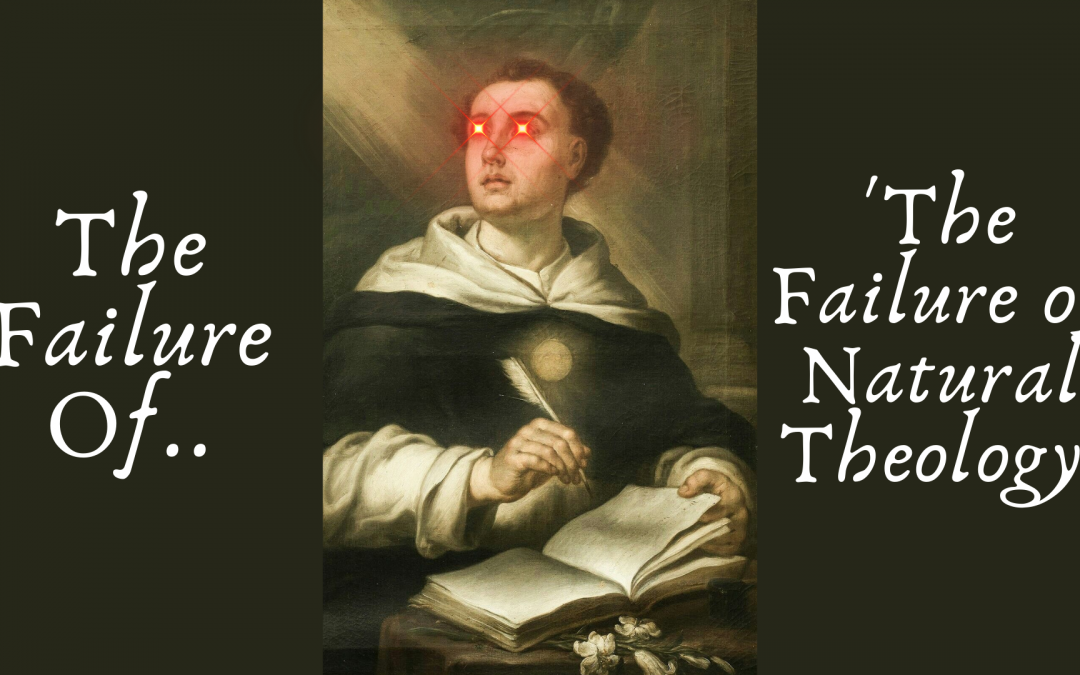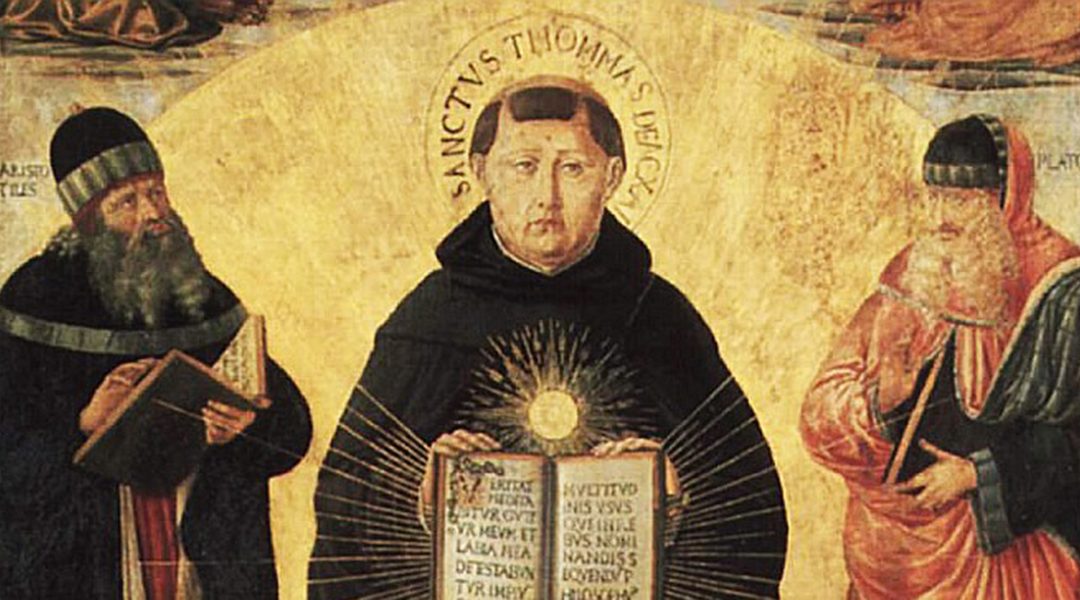
The Failure of ‘The Failure of Natural Theology’—A Review (Chs. 1-3)
Jeffrey Johnson’s new book, The Failure of Natural Theology: A Critical Appraisal of the Philosophical Theology of Thomas Aquinas (FNT, henceforth), has made no little splash both prior to and following its publication. As I work my way through Johnson’s book, I am pleased to read some interesting historical tidbits of Aquinas’ life. And I am also grateful for the opportunity to think about the relevant issues in a deeper way than I have previously. That said, as far as it goes, there is very little I can commend concerning the attitude and subject-matter of this volume. Considering this book in proportion with what it claims to achieve should lead the careful thinker to judge The Failure of Natural Theology quite the failure itself.
From obviously selective quotation, not only of Thomas, but also of John Calvin, John Owen, and others, to blatant denial of Christian orthodoxy, this book doesn’t so much represent a nuance within the orthodoxy of Reformedom, but a departure from the first principles of Christianity altogether. I will elaborate upon these concerns throughout the remainder of this review.
An Alleged Dilemma
Chapter 1 of Johnson’s book is titled, ‘Natural Theology’s Dilemma’. Up to this point, readers should be able to see some categorical confusion as early as the introduction. “As this book will seek to demonstrate,” he says, “Thomas added to God’s simple and immutable nature and additional attribute not taught in the Scriptures: divine immobility (FNT, 5).” A red flag, to be sure. “What is motion but change?” many, like myself, may ask while reading this. “And if God changes, then is He not mutable?” No doubt, an explanation for what appears to be a denial of the law of identity is in order. But further study of this volume reveals such vindication is hopeless. Monkeying with analytical propositions at the outset is no way to begin an academic treatment of natural theology (i.e. a denial of motion inheres in the very meaning of the term immutability because motion is but a species of change).
Johnson, in ch. 1, becomes concerned with the confusion of natural theology with natural revelation, which is not altogether unwarranted. But here he makes a mistake fatal to his own credibility by launching a volley of indemonstrable accusations against other theologians. He even names R. C. Sproul among those who confuse natural theology with natural revelation, “R. C. Sproul made this mistake when he attempted to justify Aquinas’s natural theology by appealing to verses in the Bible that affirm natural revelation.” This is the most embarrassing instance, because in the very same book sourced by Johnson, Sproul, in point of fact, makes a very careful distinction between natural theology on the one hand and general/natural revelation on the other:
“Natural theology” is discourse about God informed by our knowledge of nature. It is a knowledge of God gained through an understanding of the external world, in addition to and distinct from the knowledge of God available to us in the Holy Scriptures. Natural theology traditionally has been based on what theologians call general revelation. General revelation is God’s self-disclosure in his created universe. This revelation is an objective act of God that does not rely on our perception of it in order to be true. Natural theology is the human response to general revelation. Natural theology is a human act, a way for us to understand God’s revelation of himself in creation. General revelation is what God does; natural theology is what we do with that revelation.
He also makes claims like, “Natural theology is the philosophy of religion, and the philosophy of religion is limited to what can be known about God through reason and our empirical senses (FNT, 11).” The question, then, becomes, “If our reason is not the instrumental means for knowledge, how do we know anything?” For we can’t even apprehend awareness of our own existence apart from consciousness, which resides in the intellect.
Just as he misrepresented Sproul, he misrepresents Aquinas, when he says, “Natural theology, at least for Aquinas, begins on the false notion that man is ignorant of God.” This is patently false given Thomas’ words in the Summa Theologiae, I, Q. 2, Art. 1. There, he says, “To know that God exists in a general and confused way is implanted in us by nature, inasmuch as God is man’s beatitude.” And Thomas’ view of innate or implanted knowledge is further evinced in his commentary on Romans 1. Commenting on v. 19, he says, “what can be known about God by men through reason, is manifest in them, i.e., is manifest to them from something in them, i.e., from an inner light (Commentary on Romans, C. 1 L. 6).” And speaking to the divine Logos in his commentary on John, he says, “He was the true light, which enlightens every man coming into this world (L. 5).”
The most troubling part of ch. 1, and that which no doubt shows an underlying confusion affecting the whole of the work, arises when Johnson attempts a definition of natural revelation. He says, “Natural revelation is the knowledge of God revealed to us by God in nature. Through natural revelation, we know that God is both absolute and personal (FNT, 13).” Pay careful attention to Johnson’s identification of revelation with knowledge. This is a subtle, but important, confusion of the order of being (what objectively is regardless of our knowing it) and the order of knowing (our knowledge of what objectively is). Is natural revelation knowledge, or is it that through which we know? It cannot be both, because then revelation would be one and the same thing with the human act of knowing. Subjectivism, or relativism, would be the result.
He makes this subtle confusion again on p. 16, “Natural revelation, therefore, extends and is limited to the infallible knowledge of God, which is revealed universally, effectually, immediately, and consistently.” Paired with his assertion that all people apprehend this natural revelation which, in his words is infallible knowledge, Johnson implies pagans not only have inerrant (does not err) knowledge of God but infallible (cannot to err) knowledge of God.
For Johnson, natural theology’s dilemma is its alleged inability to apprehend truth about God. Natural theology, since it involves the operation of man’s reasoning through the created order, cannot reach a transcendent Creator, or so it is thought. But by defining natural theology as a failed alternative to natural revelation, he separates the act of knowing (science, theology) from the object to be known. In trying to escape any affiliation with human reason, Johnson has opted to exile reason altogether in favor of what he terms immediate natural revelation. Criticizing natural theology once more, he says, “the conclusions of natural theology take time to reason through. Syllogisms are a process. The mind doesn’t see the conclusion of the syllogism immediately, but it has to connect the dots. Therefore, natural theology is not immediate (FNT, 20).”
Apparently, the implication is a non-discursive natural revelation instead of discursive natural theology. But in order to exile reason altogether, Johnson has to put natural revelation in us in “immediate” terms such that there is no formal distinction between our knowledge on the one hand and God’s revelation on the other. Amidst all the problems we could speak of at this juncture, one that stands out to me is the confusion concerning argumentation or syllogisms. The design of syllogisms is to make that which is already implicitly in the mind explicit. Syllogism is but a formal regurgitation of the natural process of human reason. According to Johnson, such argumentation takes time. To organize thought into a formal argument? Sure. But it takes virtually no time at all for our minds to naturally do the same in an involuntary and near-instantaneous act. Syllogizing an argument only attempts to systematize the already-natural mode of human thinking. Descartes knew he existed prior to concluding, “Therefore, I exist.” His cogito ergo sum was but his way of making explicit what was already in his intellect implicitly.
The unfortunate byproduct of Johnson’s immediacy is the absurd rejection of the necessity of consciousness. “The mind,” he says, “doesn’t see the conclusion of the syllogism immediately…” but, in the strictest sense, creatures see nothing immediately. Inasmuch as they depend on this or that to know, they see mediately. Consciousness is a bare minimum requisite to seeing anything beyond it. But, according to Johnson, this connecting of dots, from consciousness to that which lies beyond it, seems wholly forbidden when it comes to knowledge about God. True knowledge of God is had immediately or not at all. Johnson does tip his hat to consciousness, but in an unexplained sort of way, “The knowledge of God that comes through natural revelation is not the conclusion of a syllogism rooted in science. Rather, it is the immediate awareness of God that comes with the awareness of self and nature.” If he means there is an awareness of God chronologically consonant with knowledge of self that is one thing, though I would argue the point in another place. But there continues to be a causal relationship. I could not know God apart from knowing myself. Self-consciousness is causally requisite to our knowledge of God. But again, Johnson is trying to avoid anything that would imply God is a conclusion in our thinking rather than the presupposed starting point, a la., Cornelius Van Til.
Philosophy & Theology: A Marriage Not to Last?
The most baffling aspect of this book is the juxtaposition between the creature’s act of knowing, or process of reasoning, versus his apprehension of natural revelation. He writes, “According to the Bible, God’s existence, transcendence, and immanence are clearly manifested (without argumentation or logical proof) in natural revelation… Instead of building on the foundation of natural revelation… Aquinas built below that foundation by claiming that the knowledge of God needs to be rationally demonstrated from sense experience (FNT, 48-49).” But if by “rationally demonstrated” Johnson understands Aquinas to mean explicit and formal “argumentation or logical proof,” then he does not understand Aquinas. Aquinas, on the demonstration of God’s existence, says:
The existence of God and other like truths about God, which can be known by natural reason, are not articles of faith, but are preambles to the articles; for faith presupposes natural knowledge, even as grace presupposes nature, and perfection supposes something that can be perfected. Nevertheless, there is nothing to prevent a man, who cannot grasp a proof, accepting, as a matter of faith, something which in itself is capable of being scientifically known and demonstrated (ST, I, Q. 2, Art. 3).
According, therefore, to Aquinas, those incapable of understanding or construing rational, formal proofs may still have knowledge of God through faith. Johnson falsely claims Aquinas rejected the notion of simple-minded apprehension of natural theology when he writes, “For Aquinas, only those who can sensibly understand the proofs and rational arguments of philosophy are able to properly accept its logical conclusions (FNT, 39).” I had expected better from someone who claimed at the outset of his work “years of studying the life and works of Aquinas (FNT, 3).”
Another issue that becomes quite apparent in this chapter, and only grows worse from here on out, is Johnson’s selective quotation of historical works, not only from Aquinas, but also from Calvin and Owen. In ch. 2, he repeatedly quotes from John Owen’s Biblical Theology, but, as far as I can tell, never interacts with Owen’s own view of natural theology. For example, Owen, speaking of the continuance of natural theology, says:
This is not to say that natural theology ceased entirely to exist, or that this new phase (on which we are now embarking) simply replaced it bodily. Rather, the strands of the two combine; remnants of the former surviving the inroads of corruption and combining with the latter and, so, progressing onwards through several noteworthy stages which must be examined.
Though, as Johnson notes, Owen rightly believed natural theology could not help the natural man (only adding to his condemnation), he nevertheless conceived of its continued existence. Owen, it should be noted, did not believe natural theology harmed the natural man because it was untrue, but precisely because it was true (contra Johnson), and the natural man perverts it in his ethical rebellion against God. Why doesn’t Johnson ever engage the natural theology of the Reformed and post-Reformed, a la., Junius, Turretin, Van Mastricht, and/or Owen? Would it not have been more academically responsible to show where the Reformed and post-Reformed aligned with Thomas and also where they differed from him? This question, I suppose, the judicious reader should decide.
The Natural Theology of Aristotle
Chapter 3 is one of the least sourced chapters in the book, and its quality reflects accordingly. After characterizing Aristotle’s argument from motion, on p. 66, Jeff Johnson rejects orthodox theology proper by touting, “Actus purus (pure actuality) is not the God of the Bible.” In the same place, he writes, “the cosmological argument does not lead to the God of the Bible.” Here, Johnson’s confusion of the order of being with the order of knowing comes to a fore. Due to the nature of the argumentation, especially as Thomas frames it, Johnson needs to show one or more of the premises to be false. If he cannot do this, the conclusion necessarily follows. If the conclusion necessarily follows, it cannot be denied with any more consistency than a denial of the formal laws of logic. This is how syllogistic modal argumentation (modus tollens/ponens) works. So, if the cosmological argument ends with a true conclusion, it must conclude at the God of the Bible, since it would be logically impossible for the conclusion to be false.
Trying to explain why a God who is actus purus cannot be the God of the Bible, Johnson says, “According to the logic, actus purus can’t be the efficient cause of the universe because an efficient cause requires movement (FNT, 68).” Johnson does not believe a God that is pure actuality could create since motion is altogether removed from Him. But he has already noted Aristotle’s definitive characteristic of motion, that being the joining of form and matter (FNT, 57). Thomas rightly notes that since God, as I’m sure Johnson would agree, brings both form and matter into existence, there is no motion required in Him, nor must it be presupposed in His work of creation (ST, I, Q. 46, Art. 1). Is this difficult to understand? Sure. Is it illogical? Absolutely not. Is it necessary to affirm? Yes, without hesitation. The only other option would be to opine form and matter in God, a formal and material cause in Him, as it were.
Johnson, at this point, would want to reply, “What is true of the phenomena is not true of the noumena,” or, “What is true of the physical world we experience, is not true for the metaphysical world, per se (FNT, 65).” However, this can’t be the case because the Bible, which is creature, communicates true things about God via creaturely (finitely intelligible) means. If the phenomena cannot tell us anything about the transcendent reality of God, it would follow that the Bible could not communicate anything true about God.
Johnson’s biggest mistake in ch. 3 occurs when he says:
This jump from the study of the cosmos (physics) to the study of God (metaphysics) is based on a single, unfounded premise—that what is true concerning finite objects in motion in the physical realm must be true concerning motion (if mobility were possible) for God in the metaphysical realm (FNT, 65).
Functionally, Johnson has just adopted Immanuel Kant’s idealistic worldview based on a fundamental separation between the phenomenal realm (physical, experienced) and the noumenal realm (God, heaven, cannot be known through the phenomena). This single assumption would destroy the fundamental assumption of Christianity that God has indeed revealed Himself through creaturely means, both nature and Scripture. If the material world cannot tell us about God, or if it is unreasonable to assume that it does, it follows that Scripture cannot tell us about God.
Moreover, motion is precisely what is denied of God in Aristotle and Thomas. And it is denied not because, as Johnson claims (FNT, 58), they assume it to be an imperfection, but predominantly because it would entail contingency in the divine essence. The reason motion is seen as a privation of perfection is because it requires composition and thus dependence. In terms of creation, which is what Johnson seems most concerns with, if God needs movement in order to actuate the universe, then God needs something He did not have before, i.e. motion. But this is contrary, of course, to places like Acts 17:25, “Nor is He worshiped with men’s hands, as though He needed anything, since He gives to all life, breath, and all things.” Johnson reveals this assumption when he asks the question, “But if Aristotle’s god cannot move, how will he actively move anything inside or outside himself?” For Johnson, God needs something, i.e. motion, in order to bring about His effect. He is a contingent God.
Conclusion
There are two ways to evaluate an argument. One can judge an argument by looking at what it claims/concludes. Or, one could judge an argument by looking at its implications. So far, Johnson’s book isn’t only a non-starter, it is heterodoxical to the core. The argument is, thus far, not only incoherent, but it leads to heretical implications concerning who God essentially is. Also, the supporting subject-matter has been selectively quoted and misrepresented throughout these first three chapters. So, I want to close this first part of my review by saying the following:
Jeff, you have departed from Christian orthodoxy in this book.
Hear me carefully and clearly, I do not think this means you’re not a Christian. I think that, with time, review, and admonishment, you will end up either changing or revising your views to fit within the biblical and orthodox parameters, not only on natural theology but also on the doctrine of God. This is my hope and my prayer. Also, I make this rebuke public since your work in question is quite public already.
Please. Please. Please walk backwards, brother.
May the Lord bless you.





